
President Trump has proposed what he calls a “fair compromise” with Congress on immigration policy, with four main components:
Item one is a concession to Democrats in Congress; items two through four are immigration restrictionist priorities that Trump and his allies on the issue have long wanted. The Cato Institute’s David Bier and Stuart Anderson estimate that the package would result in a 44 percent cut in legal immigration, while the Center for Global Development’s Michael Clemens and Jimmy Graham note that the package would disproportionately reduce the flow of black, Hispanic, and Muslim immigrants.
Trump cannot pass this plan without significant support from Senate Democrats, who otherwise can choose to filibuster and block it. And a growing number of commentators are urging Democrats to accept a deal along these lines and embrace the possibility of a grand bargain on the issue. To do otherwise would be to embrace an extreme pro-immigration stance that’s out of line with the country.
The fact of the matter is, though, that while relief for DREAMers is wildly popular with the American public, a border wall and reducing immigration levels are not. As you might imagine, most Americans don’t have especially detailed views on specific questions of immigration policy, like “should we end the diversity visa lottery” or “should we change the standards for family sponsorship,” and polling on those kinds of specifics is all over the place.
But on the big questions, the prevailing public sentiment is reasonably clear: People want relief for DREAMers. They don’t want a border wall. And they want immigration levels kept constant or increased, not lowered. It’s totally in line with public sentiment for Democrats and pro-immigration Republicans in Congress to insist on a deal that helps DREAMers without building a wall or cracking down on immigration.
People love the DREAM Act, don’t want a border wall
The incredibly useful polling aggregator Polling Report has a rundown of recent surveys asking Americans if they’d support a bill that “allowed undocumented immigrants who were brought to the U.S. as children to remain in the United States legally,” to quote Quinnipiac’s exact wording. The phrasing differs from poll to poll, but the findings are remarkably consistent and overwhelming:
- Quinnipiac, January 19-23, 2018: 75 percent support such a bill, 18 percent oppose it.
- ABC News/Washington Post, January 15-18, 2018: 87 percent support a “program that allows undocumented immigrants to stay in the United States if they arrived here as a child, completed high school or military service and have not been convicted of a serious crime”; only 11 percent oppose.
- CNN, January 14-15 and 17-18, 2018: 84 percent want to continue Deferred Action for Childhood Arrivals (DACA) program (“a U.S. government program allows some immigrants who were brought to the U.S. illegally as children to remain in the U.S. without risk of deportation. To qualify, immigrants had to be under the age of 30 as of 2012, have no criminal record, and be a student, in the military, or have earned a high school diploma.”); 11 percent want to end it.
- CBS News, January 13-16, 2018: 87 percent favor “allowing young immigrants who were brought to the U.S. illegally as children to remain in the country if they meet certain requirements such as going to school or joining the military, and not having a criminal record”; only 11 percent oppose.
- Pew Research Center, January 10-15, 2018: 74 percent favor a law granting “permanent legal status” to “immigrants who came illegally to the U.S. when they were children”; 21 percent oppose.
- NBC News/Wall Street Journal, December 13-15, 2017: 62 percent support continuing DACA; 19 percent supporting ending it.
- Marist, December 4-7, 2017: 58 percent want to let DREAMers become citizens, 23 percent want to let them stay not as citizens, 15 percent want to deport them.
Issue polling is always dicey, especially on specific proposals that pollsters describe in detail, and it’s important not to vest too much importance in a single poll along these lines.
But the consistency of public opinion across pollsters and question wordings is striking. Relief for DREAMers never gets less than 62 percent support, and usually gets numbers in the 70s and 80s, a truly massive number for a supposedly controversial political issue. Less than 20 percent of Americans oppose it.
What about a border wall? Again, let’s go to the Polling Report figures:
- ABC News/Washington Post, January 15-18, 2018: 63 percent oppose a wall on the border with Mexico; 34 percent support one.
- CNN, January 14-15 and 17-18, 2018: 62 percent oppose a wall; 35 percent support one.
- CBS News, January 13-16, 2018: 61 percent oppose a wall; 35 percent support one.
- Pew Research Center, January 10-15, 2018: 60 percent oppose a wall; 37 percent support one.
- Quinnipiac, January 5-9, 2018: 63 percent oppose a wall; 34 percent support one.
Once again, the polling is remarkably consistent. And what’s more, support for the wall has actually fallen since Trump began running for president. Quinnipiac, for instance, found that the share of Americans opposing a border wall has grown from 55 percent in November 2016 to 63 percent in January 2018:
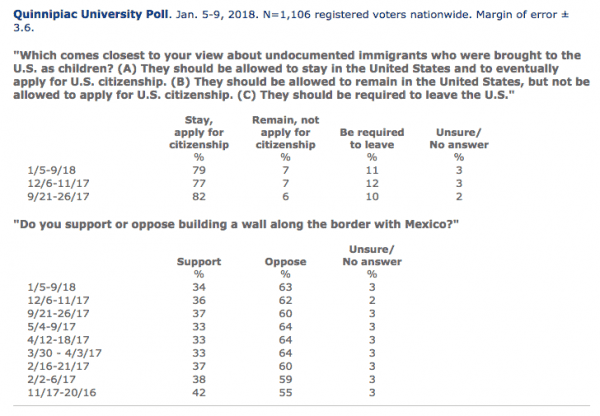

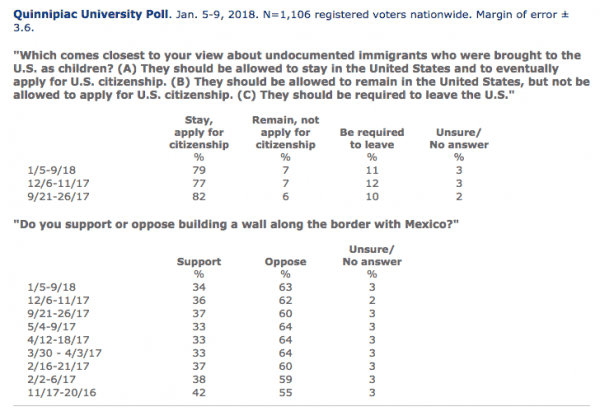
UC Irvine’s Michael Tesler documented a decline in public support for Trump’s border wall as early as August 2016, arguing that the campaign itself was enough for Trump’s views to turn off the American public.
What about overall immigration levels? According to the most recent Gallup polling, 38 percent of Americans want to keep immigration levels constant, 24 percent want to increase them, and 35 percent want to lower them. Not only is there a consistent majority for the status quo or greater immigration, but the share of Americans wanting less immigration has fallen in recent years:
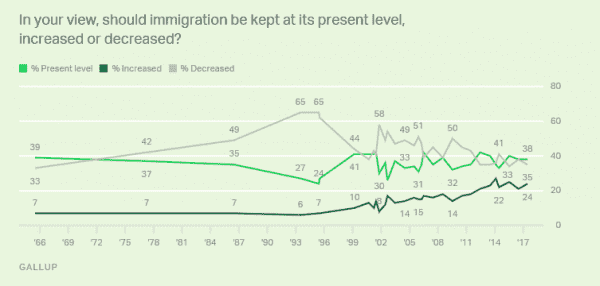

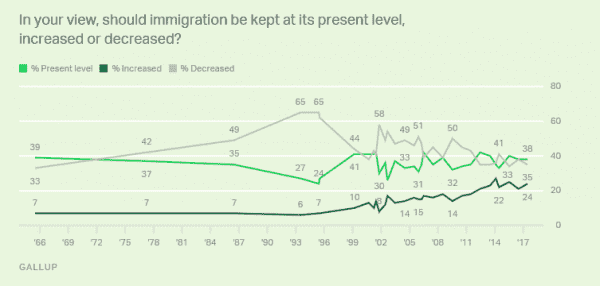
In the mid-1990s, the majority of Americans really did want to cut down on immigration, and that was the majority or plurality position for much of the 2000s. Things are different now, and restrictionism appears to have become a minority position.
Other polls, like the General Social Survey and the National Election Survey, have found the same thing:
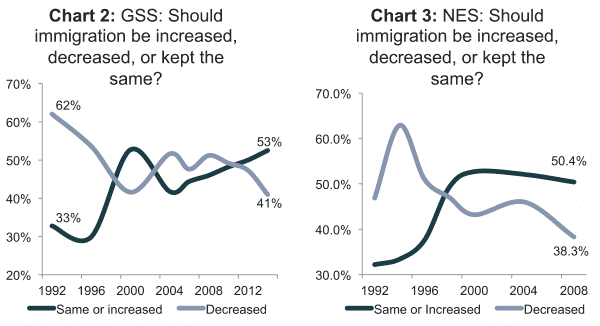


Immigration restrictionists might note that a Morning Consult poll from last August specific to the RAISE Act — a Trump-endorsed measure to cut immigration levels in half — found that many Americans were sympathetic to it. The poll asked about a battery of elements of the bill, from refugee policy to family sponsorship to English language requirements. On the most easily understandable question polled — whether respondents support a one-half cut in the number of legal immigrants — they found that 48 percent of registered voters support the measure, compared to 39 percent opposed and 35 percent with no opinion.
Given the Gallup, GSS, and NES polling, I’m inclined to think that’s a slight outlier, perhaps affected by framing the issue around a specific bill rather than the general question of how much immigration voters want. But even that poll failed to find majority support for restrictionism, and found that 66 percent of Americans say legal immigrants “strengthen our country” compared to 20 percent who call them “a burden.”
A more sophisticated restrictionist counterargument would note that most Americans don’t have detailed or strongly held views on most political questions, and that the pro-immigration majority that surveys are finding isn’t durable or meaningful. I’m somewhat sympathetic to that argument. While the polling on the DREAM Act and the border wall is compellingly consistent, there’s plenty of reason to believe people don’t have durable political ideologies and largely copy their views from political elites. As the USC political scientist Morris Levy told the New York Times’s Thomas Edsall, “The great majority of Americans do not hold clear, stable, well-defined positions on almost any of these issues.”
But if the issue polling showing that immigration is popular is irrelevant, then policymakers should simply make their decisions based on the merits of the issue. And the fact of the matter is that immigration is a tremendous economic and social boon to the United States and restricting it will make Americans already living here worse off on net. When considering both public opinion and the policy merits, Democrats and pro-immigrant Republicans are on very solid ground in opposing a deal that enacts a large cut in legal immigration.
Sourse: vox.com






